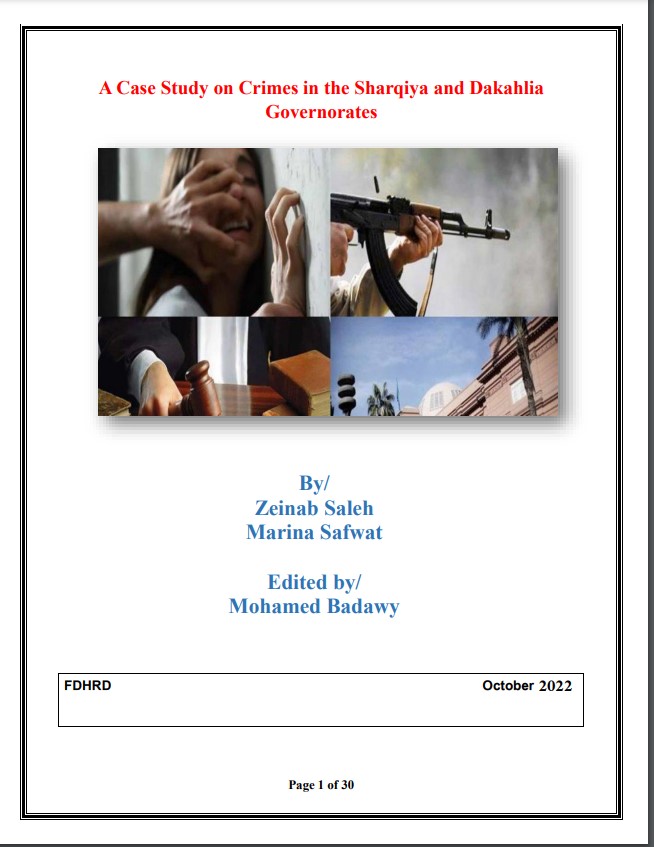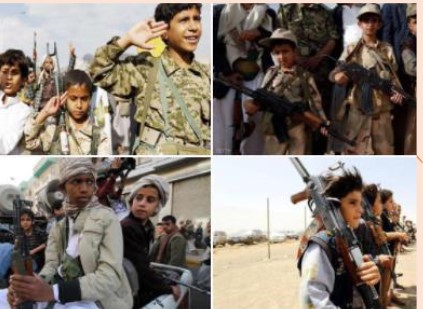The Forum for Development and Human Rights Dialogue (FDHRD) publishes today, Monday 3/10/2022 a case study on crimes in the Sharqiya and Dakahlia governorates, through which it discusses the main reasons for the spread of crime in the Sharqiya and Dakahlia governorates in the past.
The study attributed this to each of the following reasons:
• Education and upbringing: The spread of most moral transgressions or crimes anywhere in the world, regardless of their classification and no matter how large or small they are, falls under the factor of education, upbringing, family care, and families’ interest in the upbringing of their children in a sound psychological, educational, moral and religious environment and conditions;
• The role of social media: social media has a negative role in presenting these crimes and spreading them widely among people without real awareness, by repeating the talk about crimes and describing the method of their implementation;
• Geographical characteristics: the rural nature of the two governorates, the large number of terrorist outposts, and the inability of security to control all parts of the villages of these governorates, as most of these villages are remote and in places almost cut off from life, in addition to the fear of the people who live in those villages and governorates from confronting criminals and inaction to report to the police;
• Drug and alcohol abuse: The study confirmed that Sharkia Governorate ranks second highest in alcohol consumption, and third highest in drug abuse among Egypt’s governorates, and we find that Dakahlia is the seventh in drug abuse.
These statistics reflect the reason for the increase in crime rates in these two governorates.
• Increasing poverty rates: the last period witnessed an increase in cases of illegal immigration among young people in search of money and “a livelihood.” According to statistics, the governorates that witness most emigration in Lower Egypt are: Sharqiya, Dakahlia, Qalyubia, Menoufia, Gharbia, Beheira, and Kafr El-Sheikh.
The studies added that economic reasons are the most important reasons for emigration, as a large proportion of the study sample indicated insufficient income, unemployment, and the desire to raise the standard of living, and save money for the purpose of marriage.
• The spread of domestic crimes: The reasons for the spread of domestic crime in Egyptian homes are multiple. The most prominent of which is the existence of an imbalance in family values and social relations, and the absence of religious discourse calling for behaviour change, love and tolerance.
The study also showed the following analysis
• The largest percentage of crimes in the two governorates are murders, but the causes of murder differ from one governorate to another. The largest percentage of murders in the eastern governorate is for acts of thuggery, while the largest percentage of murders in Dakahlia governorate is due to family disputes.
• Murders in the two governorates in the foreground, followed by acts of violence and beatings, followed by defamation and harassment
• Bullying is the main motive in the two governorates, followed by family disputes
• The crime rate in Dakahlia governorate is higher than the crime rate in the Sharqiya governorate
Saeed Abdel Hafez, head and founder of the FDHRD, said that the recent spread of crime in the unfamiliar governorates of Dakahlia and Sharqiya is due to many factors, which should not be dealt with using intimidation or underestimation. He stressed that the solution lies in the family and presenting successful and purposeful models to confront problems, appealing to the need to present ambition to young people and shining models.
Mohamed El-Badawy, Director of Research and Programs at the FDHRD, confirmed the increase in the crime rate in Egyptian society, which is related to its conditions and characteristics, as well as the changes that occurred in it. He stressed that education is the cornerstone of personal formation and upbringing together. The absence of the role of parents in education and their preoccupation with material life and trying to provide the requirements of life and neglect of emotional satiation for children, and the mistakes of education lead to a perverted generation.
A case study on crimes in the Sharqiya and Dakahlia governorates








